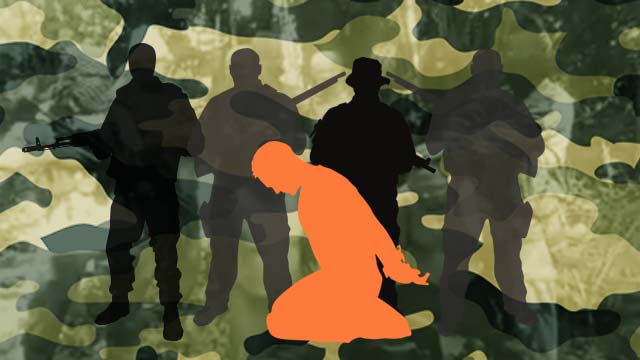Kidnap-for-ransom (KFR) incidents in Sulu province have gotten out of hand. It appears that the government is powerless to do anything about it and can only react after the fact – after victims have been abducted and they, and their families, are subjected to physical and psychological torture.
While there have been a few instances wherein the authorities succeeded in pressuring the kidnappers so that the victims either escaped or were released, in the vast majority of cases – over 75%, it would appear – KFR victims were freed because ransom was paid.
These KFR incidents have escalated in recent years and have become more audacious. Compared to earlier years when 11, 9, and 12 victims were kidnapped in 2011, 2012, and 2013, respectively, in 2014, 26 persons were kidnapped. Last year, there were 20. In March and April of this year, 18 persons were abducted.

Moreover, abductions have spread out to Sabah, Palawan, and Davao aside from the usual kidnapping grounds of Sulu, Basilan, and Zamboanga.
In 2014, 4 kidnapping incidents took place in Sabah. Because the Malaysian government reinforced the Eastern Sabah Security Command (ESSCOM) which it had set up in 2013, the cross-border incidents were reduced to only one in 2015. But the ASG shifted its tactics and is now preying on vessels plying between Borneo and the Philippines. The 18 persons kidnapped in March and April of 2016 were all crew members (Indonesian and Malaysian) of vessels sailing between Borneo and the Philippines.
Kidnappers have also shown themselves to be merciless with regard to their victims. Two-year-old Zynielle Jay Garban was strangled and thrown into the sea as the kidnappers fled Pitogo in Zamboanga del Sur where they abducted the child, her 3-year-old brother, and a 17-year-old cousin. Barangay Chairman Rodolfo Buligao was decapitated by his kidnappers in August 2015, while the same fate befell Malaysian Bernard Then in November of the same year.
Now, the ASG executed Canadian John Ridsdel after their atrocious demand for a P300 million ransom payment was not met. (READ: Aquino orders rescue of foreign hostages)
Gov't strategy, community support
Clearly, the Philippine government's strategy against the ASG is not working. Over the last 5 years, there have been a total of over 50 kidnapping incidents in Sulu and in other places. In the case of the latter, the victims were brought to Sulu.
These 50-plus kidnapping incidents involve close to 100 victims. About 44 of these incidents were completely or partially resolved. Partial resolution means one of the victims was released but others remain in captivity. Of these resolved cases, it is estimated that 75% involved ransom payment. Based on publicly available information, a total of P668 million (US$14.5 million) was paid for 15 of these cases.
The government's basic strategy is to negotiate with the kidnappers through private parties like the victims' relatives or friends, though these negotiations are overseen by the Anti-Kidnapping Group of the Philippine National Police. Meanwhile, the Armed Forces of the Philippines conducts operations in the hope of either rescuing the victims or creating conditions that would allow the victims to escape. In undertaking this strategy, the government takes due regard for the safety of the victims and civilians who may be affected by the military operations.
Two years ago, there was a proposal for national authorities to create an Inter-Agency Task Force to look into the Abu Sayyaf problem. Unfortunately, it was not given sufficient attention. The Philippine Marines also strived to build closer relationships with local communities through a Community Relations Training (CRT) program, which was receiving favorable response from communities in Patikul, the center of ASG operations in Sulu. Unfortunately, their efforts lost steam as greater attention was given to military operations.
It is time to take more aggressive measures but this has to be done with the support of the people of Sulu. Without it, any such measures are bound to backfire and fail. Exactly what these measures will be needs to be threshed out by a group that understands the situation in Sulu and the psychology of the people. Moreover, the local government officials of the province must be fully involved and must be made accountable for the peace and order conditions within their jurisdiction.
The time to address the situation is now.– Rappler.com
Victor M. Taylor has worked in the academe, the NGO sector, government and the business sector. He started his professional career as an instructor at the Notre Dame of Jolo College, in Jolo, Sulu, which introduced him to the culture of the Muslim provinces in the Southern Philippines. He has maintained contact with the people in Basilan, Sulu, and Tawi-tawi area and has followed the situation closely over the last 50 years. He is now based in Toronto, Canada.
LISTING OF SULU-RELATED KIDNAPPINGS